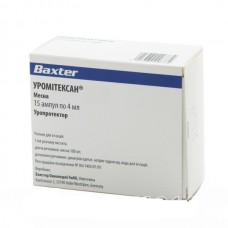Expiration date: 11/2025
Composition
1 ml of solution contains
the active substance is mesna 100 mg,
auxiliary substances: disodium edetate, sodium hydroxide, water for injections.
Description
Clear, colorless liquid
Pharmacotherapeutic group
Drugs that reduce the toxicity of cytostatic therapy
Pharmacological properties
Pharmacokinetics
When administered intravenously, mesna is quickly oxidized to disulfide (dimesna). In the epithelium of the renal tubules demesne restored to the free thiol compound, which irreversibly binds to metabolites oksazafosforinov, forming a non-toxic stable thioethers. Relationship with blood plasma proteins is 69-75%. Systemic clearance-1.23 l/h/kg. After the on/in the dose of 800 mg half-lives of mesna and dimesna blood be 0.36 hours and 1.17 hours, respectively. About 32% and 33% of the administered dose was deduced with urine in 24 hours, respectively, in the form of impurity and dimesna. A large part of the recovered dose was deduced with urine during 4 hours. In accordance with the protective action exerted on the bladder, the impurity is distributed in the urine, where the bioavailability of the drug after intravenous administration is about 30% in SH-impurity.
Pharmacodyn Mika
Uromitexan is a detoxifying agent and has a protective effect from urotoxic side effects caused by oxazaphosphorine. Extensive and large-scale pharmacological and Toxicological studies have shown that mesna has no intrinsic pharmacological activity and low toxicity. Pharmacological and Toxicological inertness impurity with a system and a detoxifying effect in the efferent urinary tract and bladder due to the peculiarities of its pharmacokinetics. Similarly, the physiological system of the cysteine-cysteine impurity oxidizes rapidly to its primary metabolite, mesna disulfide (dimesna). Mesna disulphide remains in the intravascular space and is rapidly excreted by the kidneys. In the kidney, mesna disulfide is recovered to the free thiol compound that reacts chemically with urotoxicity oksazafosforinov metabolites (acrolein and 4-hydroxy-ifosfamide and 4-hydroxy-hydroxycyclopent-famed), resulting in their detoxification. The first stage of the detoxification process involves the binding of the impurity 4-hydroxy-metabolite, forming neurotoxic 4 sulphidity metabolite. Mesna also binds to the double bonds with acrolein and other metabolites urotoxicity. This results in a local detoxification in the kidneys and lower divisions of the urinary tract. Has no effect on the antitumor efficacy of ifosfamide.
Indications for use
- prevention of the toxic effects of oksazafosforinov (10 mg/kg) (e.g., ifosfamide, cyclophosphamide or trofosfamide) on the urinary tract when anticancer therapy with cytotoxic drugs, patients of group of risk: the earlier radiation therapy in the pelvic area, the development of cystitis during previous therapy oxazaphosphorinane, diseases of urinary system in history
Method of application and doses
- Uromitexan usually administered intravenously (slow). Single dose for adults is 20% of a single dose of oksazafosforina. The first introduction is carried out simultaneously with the introduction of the first oksazafosforina, second and third injection after 4 h and 8 h after injection oksazafosforina.
Drug interactions
Compatible with mesna with cyclophosphamide and ifosfamide, so you can enter it with them in the same solution, wherein the antineoplastic activity of the latter is not changed.
Pharmaceutical drug Uromitexan not compatible in vitro with cisplatin, carboplatin and nitrogen mustard (binding and inactivation), therefore should not be mixed in the same solution.
Systemic effects oksazafosforinov not change under the action Uromitexan. During clinical studies it was shown that overdose Uromitexan does not reduce acute, subacute toxicity, leukotoxin activity, and immunosuppressive efficacy oksazafosforinov. Preclinical studies of ifosfamide and cyclophosphamide in various tumors also showed that Uromitexan not affect their antitumor activity. Uromitexan also does not alter the antineoplastic efficacy of other cytostatics (e.g., doxorubicin, BCNU, methotrexate, vincristine), as well as the therapeutic effects of such other drugs as digitalis glycosides.
Application Uromitexan may lead to false-positive reactions when conducting rapid tests with inegrirovanny substrate for ketone bodies (eg. Rothera test, test strips N-Multistix) and false-positive or false-negative reactions when conducting rapid tests on red blood cells in the urine. To accurately determine the presence of erythrocytes in the urine it is recommended microscopic analysis.


